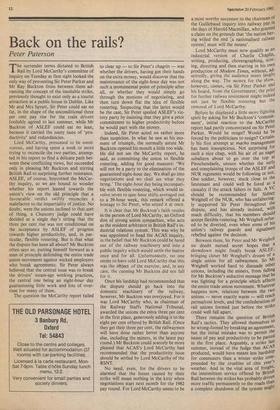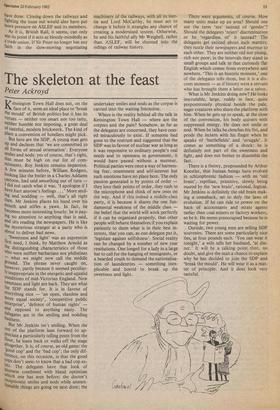Back on the rails?
Peter Paterson
The surrender terms dictated to British Rail by Lord McCarthy's committee of inquiry on Tuesday at first sight looked the only way of preventing Sir Peter Parker and Mr Ray Buckton from between them ad- vancing the concept of the insoluble strike, previously thought to exist only as a tourist attraction at a public house in Dublin. Like Mr and Mrs Spratt, Sir Peter could eat no fat, in the shape of the unconditional three per cent pay rise for the train drivers foolishly agreed to last summer, while Mr Buckton of ASLEF could eat no lean, because it carried the nasty taste of 'pro- ductivity' and redundancies.
Lord McCarthy, presumed to be omni- vorous, and having spent a week or more trying to reconcile the two parties, attemp- ted in his report to find a delicate path bet- ween these conflicting views, but succeeded only in pleasing Mr Buckton and stirring British Rail to surprising further resistance. ASLEF, of course, boycotted the McCar- thy inquiry, so we are bound to wonder whether his report leaned towards the union's view on the old principle that a favourable verdict swiftly reconciles a malefactor to the impartiality of justice. No doubt, were the unions inclined to that sort of thing, a Chancery judge could have decided at a single day's sitting that the three per cent, rise was not conditional on the acceptance by ASLEF of progress towards higher productivity, and, in par- ticular, flexible rostering. But is that what the dispute has been all about? Mr Buckton often says so, putting himself forward as a man of principle defending the entire trade union movement against wicked employers who break agreements. Sir Peter always believed that the central issue was to break the drivers' steam-age working practices, the central one being an eight-hour day guaranteeing little work and lots of over- time for many of them.
The question the McCarthy report failed
to clear up — to Sir Peter's chagrin — was whether the drivers, having got their hands on the extra money, would discover that the maintenance of the eight-hour day was not such a monumental point of principle after all, or whether they would simply go through the motions of negotiating, and then turn down flat the idea of flexible rostering. Suspecting that the latter would be the case, Sir Peter spoiled ASLEF's vic- tory party by insisting that they give a prior commitment to higher productivity before he would part with the money.
Indeed, Sir Peter acted on rather more than suspicion. In what he saw as his mo- ment of triumph, the normally astute Mr Buckton opened his mouth a little too wide. He did not see the McCarthy report, he said, as committing the union to flexible rostering, adding for good measure: 'We will not be a party to the elimination of the guaranteed eight-hour day. We shall go into negotiations and we shall see what they bring.' The eight-hour day being incompati- ble with flexible rostering, which would in- volve seven to nine hour shifts averaged out to a 39-hour week, this remark offered a hostage to Sir Peter, who seized it at once.
It is clear that Mr Buckton's faith resides in the person of Lord McCarthy, an Oxford don of strong union sympathies, who acts as the resident arbitrator in British Rail's in- dustrial relations system. This was why he was appointed to head the ACAS inquiry, in the belief that Mr Buckton could be lured out of the railway machinery and into a public inquiry which would settle the matter once and for all. Unfortunately, no one seems to have told Lord McCarthy that this was the object of the exercise, and, in any case, the cunning Mr Buckton did not fall for it.
Once his lordship had recommended that the dispute should go back into the domestic machinery of the railway, however, Mr Buckton was overjoyed. For it was Lord McCarthy who, as chairman of the Railway Staffs National Tribunal, awarded the unions the extra three per cent in the first place, generously adding it to the eight per cent offered by British Rail. (Once they get their three per cent, the railwaymen will have done rather better than anyone else, including the miners, in the latest pay round.) Mr Buckton could scarcely be more pleased that ACAS's Lord McCarthy had recommended that the productivity issue should be settled by Lord McCarthy of the RSNT.
No need, even, for the drivers to be alarmed that the losses caused by their strike will mean nothing in the kitty when negotiations start next month for the 1982 pay round. For Lord McCarthy seems to be the Guillebaud inquiry into railway pay in the days of Harold Macmillan, who granted a claim on the grounds that 'the nation hav- ing willed the end [a nationalised railwaY system] must will the means'.
Lord McCarthy must new qualify as an industrial version of Charlie Chaplin, writing, producing, choreographing, scor- ing, directing and then starring in his own production of Modern Times, without, ad- mittedly, giving the audience many laughs along the way. The money, for the show, however, comes, via Sir Peter Parker and his board, from the Government; the price for further railway investment might indeed not just be flexible rostering but the removal of Lord McCarthy.
Before he displayed a little more fighting spirit by asking for Mr Buckton's 'commit- ment', initial reaction to the McCarthy report had partly concentrated on Sir Peter Parker. Would he resign? Would he be forced by the politicians to resign? Certain- ly his first attempt at macho management has been inauspicious. Not surprising for such a nice chap, with his air of an eager subaltern about to go over the top at Passchendaele, unsure whether the surly and complaining troops of the ASLEF and NUR regiments would be following or not. One soldier, however, stuck close to the lieutenant and could well be listed as a casualty if the attack falters or fails. A VC should be recommended for Sidney Weighell of the NUR, who has unfaltering- ly supported Sir Peter throughout the dispute, and has already insisted, with much difficulty, that his members should accept flexible rostering. Mr Weighell refus ed to be diverted, even when some of his union's railway guards and signalmen rebelled against the decision. Between them, Sir Peter and Mr Weighell no doubt nursed secret hopes that a showdown might finally break ASLEF, bringing closer Mr Weighell's dream of a single union for all railwaymen. So Mr Weighell worked hard to dissuade other unions, including the miners, from falling for Mr Buckton's seductive message that he was fighting for a principle which affects the entire trade union movement. Whatever happens now, relations between the two unions — never exactly warm — will reach permafrost levels, and the confederation of rail unions formed just before the strike could well fall apart. There remains the question of British Rail's tactics. They allowed themselves to be wrong-footed by breaking an agreement, but the initial mistake was to permit the issues of pay and productivity to be parted in the first place. Arguably, a strike last summer, instead of the fudge that ACAS produced, would have meant less hardship for commuters than a winter strike CO': pounded by the cruelties of .this year `s weather. And in the vital area of freight, the intermittent service offered by British Rail between the strikes has probably driven more traffic permanently to the roads than a complete shutdown of the system met
have done. Closing down the railways and fighting the issue out would also have put more pressure on ASLEF and its members.
.As it is, British Rail, it seems, can only vim its point if it acts as bloody-mindedly as a trade union. If Sir Peter no longer has any faith in the slow-moving negotiating machinery of the railways, with all its iner- tia and Lord McCarthy, he must act to change it before it strangles any chance of creating a modernised system. Otherwise, he and his faithful ally Mr Weighell, rather than ASLEF, will be shunted into the sidings of railway history.







































 Previous page
Previous page